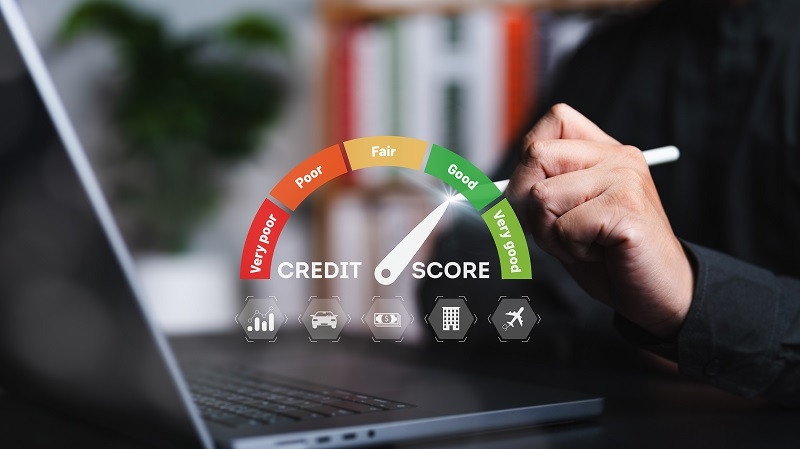Improve Your Credit Score Fast With Smart Steps in Six Months

Boosting your credit score can seem daunting, particularly if you're beginning from a zero point or recovering from previous financial errors. Fortunately, you can significantly improve with the correct credit boost techniques in six months. If you've ever asked yourself how to increase your credit score quickly, this guide has all the information you need. From beginner credit score tips to fixing bad credit and reading credit reports, we will guide you step by step through actions you can take today to place yourself on a more solid financial footing.
Why Your Credit Score Matters
Your credit score is not merely a digit—it's a passport to finance. It dictates whether you can get loans, what interest rate you will pay, and even impacts housing applications or employment. With a better score, lenders consider you less risky, and the doors of better financial possibilities swing open for you.
Since your credit score relies on categories such as payment history, credit utilization, age of accounts, credit mix, and inquiries, the secret to increasing it is prioritizing habits that favor these criteria. Adopting proven strategies, you can notice a considerable change in six months.
Step 1: Check and Understand Your Credit Reports
Before you can improve, you have to see where you are. You must know about credit reports because your score is based on this information.
- Obtain free copies: You're entitled to a free report once a year from each big bureau—Equifax, Experian, and TransUnion—on AnnualCreditReport.com.
- Check for inaccuracies: Unfounded discrepancies in personal information, duplicate accounts, or identity theft may be holding your score back for no good reason—dispute errors directly with the report bureau.
- Map out trends: Identify where you may fall short with late payments, high utilization, or too many hard inquiries, and focus on those weaknesses.
Your report is the first step to any credit improvement efforts.
Step 2: Make Payments On Time Every Time
- Payment history is 35% of your score, which makes it the most crucial piece to your score. A single mistake can drop your score significantly.
- Set up automatic minimum payments so the mistake is a lot less likely.
- Use budgeting tools or reminders to track due dates.
- If you get behind, the hurdle to overcome is the payment amount, which you should pay back as soon as possible. Once you're all caught up, a late payment will impact you less in the long term.
- For beginners learning how to repair bad credit, beginning with on-time payments is the best action you can take.
Step 3: Lower Your Credit Utilization Ratio
- Credit utilization—the amount of available credit you use—makes up roughly 30% of your score. To raise your credit score quickly, keep utilization below 30%, preferably closer to 10%.
- Pay off balances intensely, beginning with the highest-interest card.
- Ask for a credit limit increase, but only if you won't be tempted to use it.
- Use the funds elsewhere instead of charging up a card.
- Reduction in utilization indicates to lenders that you can handle credit responsibly.
Step 4: Create Positive Credit History
If you're starting from scratch or are rebuilding from a low credit score, you must create positive accounts showing responsible borrowing.
Choices include:
- Secured credit cards: You deposit money but it's reported to the credit bureaus just as any card would.
- Credit-builder loans: Provided by some banks or credit unions, they're made to create history while saving.
- Authorized user status: Have a reputable friend or family member with a good credit score add you to their account.
The trick is to use these wisely: small-ticket purchases, on-time payments, and low balances.
Step 5: Restrict New Credit Applications
Each time you apply for credit, a hard inquiry is posted on your report. Too many inquiries within a short period indicate risk and can decrease your score.
- Apply only when necessary.
- Space out applications by several months.
- When shopping for loan or mortgage terms, compare within a short time frame—credit scoring models typically view these as a single inquiry.
- This restraint not only guards your score but also habituates good credit behavior.
Step 6: Diversify Your Credit Mix
Your lenders would prefer to see that you can manage several different kinds of credit responsibly, including credit cards, installment loans, and retail accounts. Although it's not the biggest factor, your credit mix contributes approximately 10% to your score.
If you only have one, think about responsibly adding another—such as a small personal loan or retail card—if it is within your financial means. Don't go into debt that you can't afford to just have variety.

Credit Score Tips for Beginners
If you're new to credit, these credit score tips for beginners will have you on the right track:
- Begin with a single card or loan and be responsible.
- Maintain low balances and ensure you don’t carry debt longer than you must.
- Continue to check your reports regularly to keep track of all progress and errors.
- Don’t close old accounts unless needed; they benefit your credit age.
- Following the above basics will give you an excellent foundation for long-term success.
6 months to Restore Bad Credit
If you've got a low score right now, here are the credit repair techniques you can use to turn that score around quickly:
- Focus on past-due accounts: Get them current as soon as you can.
- Negotiate with creditors: Some will agree to delete negative marks if you pay or settle balances.
- Pay down high-utilization accounts aggressively.
- Add positive trade lines, such as secured cards or credit-builder loans.
- Stay consistent—six months of good behavior could trump years of mistakes.
Learning to fix bad credit means you will not have a perfect credit score overnight, but you will see results if you put discipline behind it.
Practical Credit Improvement Strategies That Work
When it comes to credit improvement strategies, consistency is really the most essential factor. Here are some practices to adopt long-term:
- Budget with your credit goals in mind—allocate funds toward debt repayment before extras.
- Use credit monitoring services to stay on top of changes.
- Maintain an emergency fund so you don't have to use credit when there are unforeseen expenses.
- Keep learning—understanding how credit works puts you in control.
- With these practices, not only do you learn how to boost your credit score quickly, but you also maintain it for the next few years.
Establishing Credit From Without a Credit History: A New Beginning
If you don't have any prior credit, the process will likely seem slightly intimidating, ambiguous, or confusing. However, creating credit from nothing is possible; just be patient.
- Get a secured credit card or a small secured loan product.
- Pay in full every month to create a positive credit history.
- Keep accounts open and active to demonstrate longevity.
- You’ll see a score develop within six months, and continued good habits will steadily raise it.
Long-Term Mindset: Beyond Six Months
Although this book emphasizes how to raise your credit score quickly within six months, real fiscal wellness results from sustaining good habits over the long term. Improving your credit is a marathon, not a sprint.
Your same ideas—prompt payments, low balances, prudent applications, and diversified accounts—will continue to work for you long after you have passed the six month mark. These practices, sustained over time, can drive your score into the excellent range, where you can unlock the very best financial prospects.
In Closing, Your Success With Credit Is Your Choice
If you are following tips about credit scores for beginners, trying to get credit established, or trying to figure out how to fix bad credit, the path towards a good credit score is the same: consistent and responsible money habits. Taking the time to learn about credit reports; reducing debt; making payments on time; and using legitimate credit repair techniques can clean up your financial situation in six months or less.
Your credit score does not define you, but it does limit your options. Start today, control yourself, and watch your financial options begin to expand.
This content was created by AI

